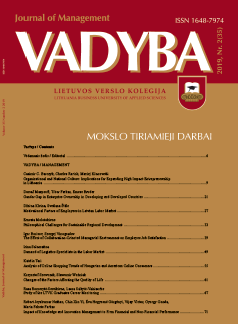SOME, ESPECIALLY LEGAL AND ECONOMIC ASPECTS OF USING
BIO-LABELS
SOME, ESPECIALLY LEGAL AND ECONOMIC ASPECTS OF USING
BIO-LABELS
Author(s): Tibor László Csegődi, Tatár JánosSubject(s): Agriculture
Published by: Lietuvos verslo kolegija
Keywords: bio labels; certification rules; organic farming problems and solutions;
Summary/Abstract: Nowadays there is an increasing emphasis on pursuing a health and environmentally conscious lifestyle, which includes organic farming using environmentally friendly production methods and healthy organic food with low levels of harmful substances. Certification marks provide consumers with certainty that the products are made to the standard and therefore play an important role in determining the market position of organic food. The beginnings of organic farming date back to the early 1920s, with Rudolf Steiner, who started dynamic organic farming in 1924. Its global expansion and development only took place later in the 1990s, due to the growing importance of health and environmental awareness, and from that time onwards, EU legislation has fundamentally defined the objectives and principles of organic production. The number of ecologically conscious farms in the EU member states is increasing year by year, considering the territorial proportions and the number of farmers. Austria, the Czech Republic, Estonia and Sweden, are the countries with the highest organic production ratio, which are well above average. Long before the introduction of the EU trademark, these countries had their own inspection and certification organizations for organic farming, giving consumers greater confidence in domestic products and brands. Compared to the EU average, the proportion of areas under organic farming and the number of farmers in Hungary is low. Our survey of more than 250 people - based on the Internet - and in-depth interviews revealed that only a very small group of people in our country regularly consume organic food: typically, middle-aged, middle-class, high-income people or families with young children. Thus, one of the problems is the lack of consumer awareness and the high price, which is already deterring most consumers from the "world" of organic food. Our country is export oriented in the field of organic food: instead of the domestic market, it is mainly aimed at the markets of Germany, Switzerland and Austria, where there is no demand for processed products, but mainly for raw materials. According to our research it is worth developing the supply and business side with methods such as grants, incentives or action plans that work well in practice
Journal: VADYBA
- Issue Year: 35/2019
- Issue No: 2
- Page Range: 91-96
- Page Count: 6
- Language: English

